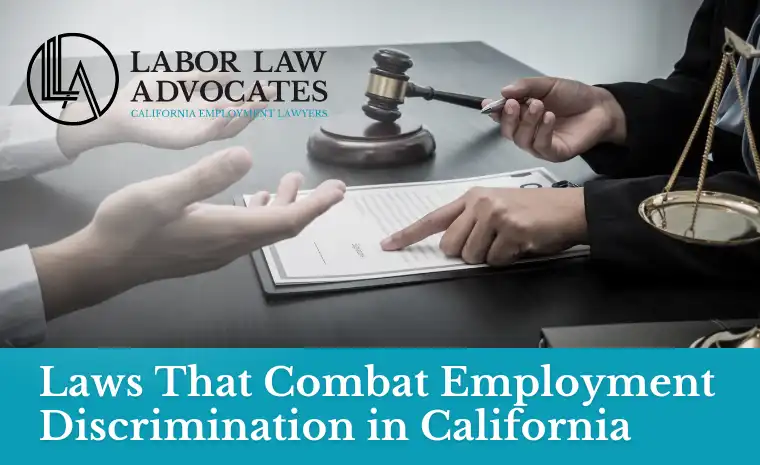Laws That Combat Employment Discrimination in California
Beginning a new job can be nerve-wracking. Despite our aspirations for professional growth and success, obstacles such as employment discrimination can hinder our progress. Even with a positive mindset and strong work ethic, these harmful situations can greatly impact our ability to contribute to the organization.
Employment discrimination occurs when an employer treats an applicant or employee unfavorably due to their race, color, religion, sex, sexual orientation, gender identity, national origin, marital status, disability, or status as a protected veteran.
It can also happen if an employer disciplines, terminates, or takes unfavorable actions against an employee or job applicant for discussing, disclosing, or inquiring about pay. Whether it is directed towards an individual or a group, discrimination is unacceptable and unlawful.
Have you been suffering from discrimination at work?
Types of Unlawful Discrimination in the Workplace
The state of California, despite its reputation as a progressive state, has experienced numerous instances of racial discrimination. According to the records of the EEOC, a total of 2,372 racial discrimination charges were filed by workers and applicants in California in 2011. A number that results in an increase not only in racial discrimination, but in other types of this unlawful treatment.

Common types of discriminatory practices include:
Age Discrimination
This type occurs when an employer treats an employee or a job candidate less favorably because of their age. It is illegal to discriminate against anyone over the age of 40. An example of age discrimination would be refusing to hire an individual because of their age, even though they are qualified for the job.
Disability Discrimination
This type of discrimination happens when an employer treats an employee or a job candidate less favorably because of their physical or mental disability. Employers are required by law to provide reasonable accommodations for employees with physical disabilities. Failing to provide an employee who is blind with appropriate technology or not allowing a wheelchair user to access certain areas of the workplace would be considered disability discrimination.
Gender Discrimination
This occurs when an employer treats an employee or a job candidate differently based on their gender expression. It is illegal to pay an employee less or treat them unfairly because of their gender. For instance, an employer who pays female employees less than male employees for the same job would be committing gender discrimination.
Pregnancy Discrimination
This type of discrimination happens when an employer treats an employee unfairly because of their pregnancy, childbirth, or related medical conditions. An employer cannot fire, demote, or refuse to hire an employee because of their pregnancy or related condition. Refusing to hire qualified employees because of their familial status, as the applicant woman is pregnant or has kids.
Race Discrimination
This occurs when an employer treats an employee or a job candidate unfairly because of their genetic characteristics, such as race or ethnicity. It is illegal to make employment decisions based on race.
Religious Discrimination
This happens when an employer treats an employee or a job candidate less favorably because of their religious beliefs or practices. It is illegal for an employer to discriminate against an employee based on their religion. An employer who refuses to accommodate an employee’s request for time off to attend a religious ceremony would be committing religious discrimination.
Sexual Orientation Discrimination
This occurs when an employer treats an employee or a job candidate less favorably because of their sexual orientation. It is illegal to discriminate against someone because of their sexual orientation.
National Origin Discrimination
This happens when an employer treats an employee or a job candidate unfairly because of their country of origin, ethnicity, or accent. It is illegal to discriminate against someone based on their national origin. An employer who only hires employees who were born in the United States would be committing national origin discrimination.
It is important to recognize and report any form of discrimination in the workplace. Employers have a responsibility to provide a safe and fair working environment for all employees, regardless of their age, disability, gender, pregnancy status, race, religion, sexual orientation, or national origin.
Has your company violated the law?
How The Law Can Help End Discrimination
California is recognized as a state with a thriving job market and ample employment prospects. It is crucial for individuals currently employed within the Golden State to possess knowledge regarding legal solutions to combat employment discrimination and be equipped to handle any potential situations.
California has implemented laws and regulations to safeguard individuals and their human rights against discrimination. Some of these legal remedies include:
California Fair Employment and Housing Act (FEHA)
This law prohibits employment discrimination based on a number of protected characteristics, including sex discrimination, race, skin color, religion, national origin, ancestry, age, disability, medical condition, gender, gender identity, sexual orientation, and marital status. The FEHA applies to all employers with five or more employees.
California Equal Pay (EPA)
This law requires employers to pay employees of different genders equally for substantially similar work. It also prohibits retaliation against employees who raise concerns about pay equity.
California Family Rights Act (CFRA)
The CFRA requires employers to provide eligible employees with up to 12 weeks of unpaid leave per year to care for themselves or family members who have a serious health condition. If an employee suffers discrimination because of their health or a family member’s health condition and is not allowed to take this leave, it is possible to present a claim against the employer.
California Pregnancy Disability Leave Law (PDLL)
Requires employers to provide up to four months of unpaid leave to employees disabled by pregnancy, childbirth, or related medical conditions. The PDLL applies to all employers with five or more employees and prohibits the organizations to fire the employee to request this leave or deny it.
California Unruh Civil Rights Act
This law prohibits discrimination in public accommodations based on a number of protected characteristics, including race, religion, gender, and sexual orientation.
California Disabled Persons Act (CDPA)
Protect individuals with disabilities against discrimination in all areas of public life, including employment.
Other Federal Laws That Protect Against Discrimination
Title VII of the Civil Rights Act of 1964
This law provides protection against employment discrimination for employees and job applicants based on race, color, religion, sex, and national origin. This protection extends to all employment decisions, such as recruitment, selection, termination, and decisions relating to terms and conditions of employment.
Age Discrimination in Employment Act (ADEA)
The ADEA safeguards job seekers and workers who are 40 years old or above from age discrimination. It prohibits employers from discriminating based on age when hiring, promoting, terminating, compensating, or providing employee benefits.
Keep in mind that some local cities and counties may also have additional anti-discrimination laws, that’s why it is so important to review them in your specific areas.
Also, having an employment lawyer by your side can help you understand the laws and the best course of action in your particular workplace discrimination case.
Labor Law Advocates Is Here to Win Your Case
All individuals deserve the best employment opportunities, a job that is dignified and where they feel appreciated and respected. Work discrimination not only affects a person professionally, but also has personal and emotional effects that can lead to decreased work quality and motivation to contribute to the organization.
If you or a loved one is dealing with this kind of harmful situation in their workplace, it is important for you to know that you have the right to fight back and go against employment discrimination.
At Labor Law Advocates, we dedicate our work to ensuring the legal rights of employees are being respected and that they get the maximum compensation for any damage that they have to endure dealing with harmful situations such as discrimination in their workplace.
We care for you, and we want you to feel valuable in your work. We are here to listen to your case, understand the situation and provide the best legal counsel for you to take legal action and get the justice you deserve!
Available 24/7. We speak English, Spanish, and Filipino. No fees until we win!




